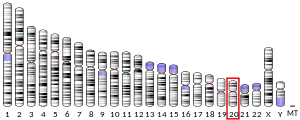Hydroxyacid oxidase (glycolate oxidase) 1
Hydroxyacid oxidase (glycolate oxidase) 1 is a protein that in humans is encoded by the HAO1 gene.[5]
| HAO1 | |||||||||||||||||||||||||||||||||||||||||||||||||||
|---|---|---|---|---|---|---|---|---|---|---|---|---|---|---|---|---|---|---|---|---|---|---|---|---|---|---|---|---|---|---|---|---|---|---|---|---|---|---|---|---|---|---|---|---|---|---|---|---|---|---|---|
| |||||||||||||||||||||||||||||||||||||||||||||||||||
| Identifiers | |||||||||||||||||||||||||||||||||||||||||||||||||||
| Aliases | HAO1, GOX, GOX1, HAOX1, Hydroxyacid oxidase (glycolate oxidase) 1, hydroxyacid oxidase 1, GO | ||||||||||||||||||||||||||||||||||||||||||||||||||
| External IDs | OMIM: 605023 MGI: 96011 HomoloGene: 6578 GeneCards: HAO1 | ||||||||||||||||||||||||||||||||||||||||||||||||||
| |||||||||||||||||||||||||||||||||||||||||||||||||||
| |||||||||||||||||||||||||||||||||||||||||||||||||||
| |||||||||||||||||||||||||||||||||||||||||||||||||||
| |||||||||||||||||||||||||||||||||||||||||||||||||||
| |||||||||||||||||||||||||||||||||||||||||||||||||||
| Wikidata | |||||||||||||||||||||||||||||||||||||||||||||||||||
| |||||||||||||||||||||||||||||||||||||||||||||||||||
Function
This gene is one of three related genes that have 2-hydroxyacid oxidase activity yet differ in encoded protein amino acid sequence, tissue expression and substrate preference. Subcellular location of the encoded protein is the peroxisome. Specifically, this gene is expressed primarily in liver and pancreas and the encoded protein is most active on glycolate, a two-carbon substrate. Glycolate oxidase oxidizes glycolic acid to glyoxylate, and can also oxidize glyoxylate into oxalate. These reactions are central to the toxicity of ethylene glycol poisoning.[6]
The protein is also active on 2-hydroxy fatty acids. The transcript detected at high levels in pancreas may represent an alternatively spliced form or the use of a multiple near-consensus upstream polyadenylation site.[5]
References
- GRCh38: Ensembl release 89: ENSG00000101323 - Ensembl, May 2017
- GRCm38: Ensembl release 89: ENSMUSG00000027261 - Ensembl, May 2017
- "Human PubMed Reference:". National Center for Biotechnology Information, U.S. National Library of Medicine.
- "Mouse PubMed Reference:". National Center for Biotechnology Information, U.S. National Library of Medicine.
- "Entrez Gene: Hydroxyacid oxidase (glycolate oxidase) 1".
- Woolf, Alan D.; Wynshaw-Boris, Anthony; Rinaldo, Piero; Levy, Harvey L. (March 1992). "Intentional infantile ethylene glycol poisoning presenting as an inherited metabolic disorder". The Journal of Pediatrics. 120 (3): 421–424. doi:10.1016/s0022-3476(05)80910-2. ISSN 0022-3476. PMID 1538289.
Further reading
- Bourhis JM, Vignaud C, Pietrancosta N, Guéritte F, Guénard D, Lederer F, Lindqvist Y (2009). "Structure of human glycolate oxidase in complex with the inhibitor 4-carboxy-5-(4-chlorophenyl)sulfanyl-1,2,3-thiadiazole". Acta Crystallographica Section F. 65 (Pt 12): 1246–53. doi:10.1107/S1744309109041670. PMC 2802872. PMID 20054120.
- Jones JM, Morrell JC, Gould SJ (2000). "Identification and characterization of HAOX1, HAOX2, and HAOX3, three human peroxisomal 2-hydroxy acid oxidases". The Journal of Biological Chemistry. 275 (17): 12590–7. doi:10.1074/jbc.275.17.12590. PMID 10777549.
- Murray MS, Holmes RP, Lowther WT (2008). "Active site and loop 4 movements within human glycolate oxidase: Implications for substrate specificity and drug design". Biochemistry. 47 (8): 2439–49. doi:10.1021/bi701710r. PMC 2683390. PMID 18215067.
- Lan S, Wang H, Jiang H, Mao H, Liu X, Zhang X, Hu Y, Xiang L, Yuan Z (2003). "Direct interaction between α-actinin and hepatitis C virus NS5B". FEBS Letters. 554 (3): 289–94. doi:10.1016/S0014-5793(03)01163-3. PMID 14623081. S2CID 83505835.
- Williams E, Cregeen D, Rumsby G (2000). "Identification and expression of a cDNA for human glycolate oxidase". Biochimica et Biophysica Acta (BBA) - Gene Structure and Expression. 1493 (1–2): 246–8. doi:10.1016/s0167-4781(00)00161-5. PMID 10978532.
- Pennati A, Gadda G (2011). "Stabilization of an intermediate in the oxidative half-reaction of human liver glycolate oxidase". Biochemistry. 50 (1): 1–3. doi:10.1021/bi101387w. PMID 21141873.
- Vignaud C, Pietrancosta N, Williams EL, Rumsby G, Lederer F (2007). "Purification and characterization of recombinant human liver glycolate oxidase". Archives of Biochemistry and Biophysics. 465 (2): 410–6. doi:10.1016/j.abb.2007.06.021. PMID 17669354.
- Danpure CJ (2005). "Primary hyperoxaluria: From gene defects to designer drugs?". Nephrology Dialysis Transplantation. 20 (8): 1525–1529. doi:10.1093/ndt/gfh923. PMID 15956068.
- Han S, Lee KM, Park SK, Lee JE, Ahn HS, Shin HY, Kang HJ, Koo HH, Seo JJ, Choi JE, Ahn YO, Kang D (2010). "Genome-wide association study of childhood acute lymphoblastic leukemia in Korea". Leukemia Research. 34 (10): 1271–4. doi:10.1016/j.leukres.2010.02.001. PMID 20189245.
This article incorporates text from the United States National Library of Medicine, which is in the public domain.



